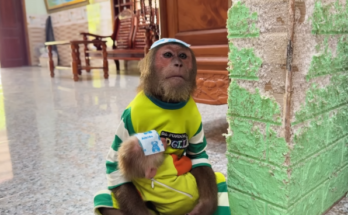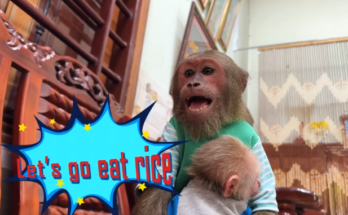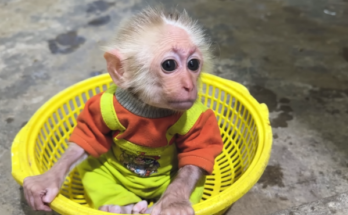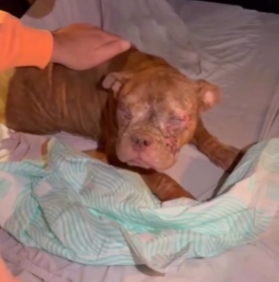
The rescue team arrived just before sunset. The air was heavy with the smell of damp earth and rusted metal. In the corner of a small, filthy backyard, a cage sat half-sunk into the mud — its occupant nothing more than a trembling shape of matted fur and hopeless eyes.
Her name, though no one had spoken it for years, was Daisy. She had once been a proud golden retriever, the kind that wagged her tail at every voice and believed the world was full of kindness. But now her golden coat had dulled to gray. Her ribs pressed against her skin. Scars ran along her back and sides like painful memories carved into her flesh.
For nearly a decade, Daisy had known only one thing: breeding.
She had been kept in that cage to produce litter after litter, her body used until it broke. When her pups were old enough to walk, they were taken — sold, traded, or lost — and Daisy was left behind to repeat the cycle. She had stopped expecting food on time. She had stopped expecting gentle hands. She had even stopped expecting life to ever change.
But when the gate opened that evening, and a soft voice called, “Hey, sweetheart,” she lifted her head.
The rescuer was a woman named Lila — mid-thirties, calm, patient, eyes full of a kind sadness. She crouched by the cage and whispered, “It’s okay now. You’re safe.”
Daisy didn’t move. Her tail didn’t wag. She had heard human voices before — voices that promised things, voices that lied. But then Lila reached through the bars and touched her head, gently, slowly, like she was afraid Daisy might break.
And something inside the old dog trembled.
It took hours to coax her out. When they finally opened the cage and lifted her into a blanket, Daisy’s frail body shook, not from fear, but from disbelief. She didn’t understand what was happening. The car ride felt strange — clean air rushing through open windows, the smell of something new: hope.
At the shelter, Lila washed her carefully. Layers of dirt slid down the drain, revealing patches of soft gray-gold fur beneath the scars. Daisy stood weakly in the tub, head bowed, her eyes distant. When Lila dried her off, Daisy leaned against her for just a second — the first voluntary touch she’d given anyone in years.
That night, in a warm kennel lined with blankets, Daisy lay down on something soft for the first time in her life. Her body ached, her eyes heavy with exhaustion, but she couldn’t sleep. She kept glancing at the door, half expecting someone to return her to the cage.
She didn’t know that her old life was over.
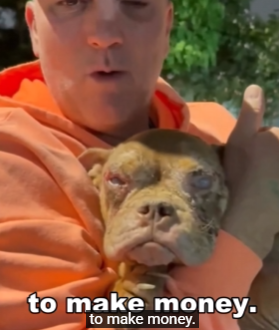
Days turned into weeks.
Daisy didn’t bark. She didn’t play. She ate only when Lila sat beside her, whispering softly, “Good girl, you’re safe now.” When the other dogs ran around the yard, she simply watched — unsure how to join, unsure what joy was supposed to feel like.
Lila learned her patterns quickly. Daisy would flinch at sudden noises. She’d cower if someone raised their hand too fast. And at night, sometimes she would wake up whimpering — the echo of years trapped in darkness still haunting her dreams.
“Shh,” Lila would whisper, kneeling beside her, brushing her hand gently through Daisy’s fur. “You’re okay now, love. Nobody’s going to hurt you again.”
And slowly, ever so slowly, Daisy began to believe her.
The first time she wagged her tail, it was barely a movement — a small, uncertain twitch. Lila smiled, eyes brimming with tears. “That’s it,” she whispered. “That’s my brave girl.”
The first time Daisy took a toy in her mouth, she didn’t know what to do with it. She carried it around awkwardly, confused but proud, as if discovering a secret the world had kept from her.
But it wasn’t until the afternoon sun poured through the windows one quiet day that something truly changed.
Lila sat on the floor beside her, reading softly from a book. Daisy was lying next to her, eyes half closed, the rhythm of Lila’s voice soothing her. When the woman absentmindedly reached out and stroked Daisy’s paw, the dog didn’t pull away this time. Instead, she sighed — a long, trembling sigh that came from deep within.
Then, without warning, she began to cry.
It wasn’t a loud cry, not the kind humans make. It was quiet — a series of soft, shaky whimpers, her body trembling as tears welled up in her eyes. Lila froze, her own heart breaking, understanding exactly what was happening.
This wasn’t fear.
This was release.
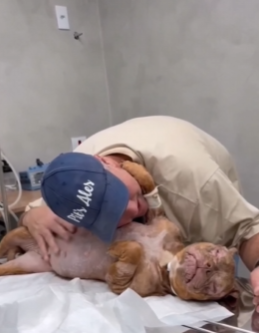
Years of pain, confusion, loss — all spilling out in the only way Daisy knew how. Her body had been used, her spirit crushed, but now, for the first time, she felt something she had forgotten existed: love without condition.
Lila pulled her close and whispered through tears, “It’s okay to let it go. You don’t have to be strong anymore.”
And in that moment, Daisy pressed her head against Lila’s chest, eyes wet, breathing slow. She felt warmth — not from the sun, but from a human heart that beat softly against her scars.
That night, when the world grew quiet, Daisy walked over to her bed, circled once, and lay down with a deep sigh. For the first time in her long, broken life, she slept without fear. Her body relaxed fully, her breathing even and peaceful.
Lila watched from the doorway, tears shining in the low light. “Sleep well, old girl,” she whispered. “You’ve earned it.”
Months later, Daisy’s transformation was nearly complete.
Her fur had begun to shine again. Her eyes, once dull and lifeless, now carried a gentle spark. She would greet Lila at the door each morning, tail wagging, moving slowly but happily. She even made friends with a puppy at the shelter — a silly, bouncy creature who followed her everywhere.
Sometimes, when the puppy tried to play too rough, Daisy would lie down and simply watch him, her expression patient and full of quiet wisdom. It was as if she understood that life, after all its cruelty, had given her one last gift — not in youth, not in health, but in peace.
Lila never tried to adopt her out. She couldn’t. Daisy wasn’t just another rescue. She was a symbol — proof that love, even when it arrives late, can still heal what years of neglect tried to destroy.
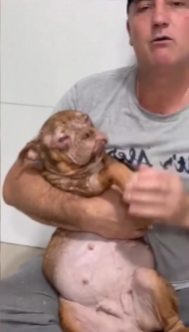
On warm afternoons, Lila would sit on the porch with Daisy beside her, the breeze ruffling her fur. The old dog would rest her head on Lila’s lap, eyes half-closed, sighing softly.
“Too old for breeding,” Lila would murmur, running her fingers over the faint scars that still marked Daisy’s skin, “but never too old for love.”
And though Daisy didn’t understand the words, she understood the tone — the tenderness, the gratitude, the bond that had grown between them.
In those moments, Daisy no longer remembered the cage, the darkness, the endless years of pain. All she knew was warmth, safety, and the quiet hum of a heart that loved her without expecting anything in return.
She had cried, yes — cried for the years she lost, for the pain she endured, for the babies she never saw again. But now, those tears had washed her clean.
She had found rest.
She had found home.
And that night, under the soft glow of a lamp, Daisy curled up beside Lila’s feet and drifted into sleep again — deep, peaceful, and unbroken.
Her scars were still there, but they no longer hurt.
Because love, at last, had reached them.
